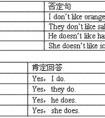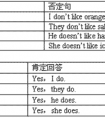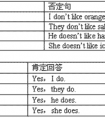动词填空。1. Li Lei isn't in. He _____(wait) for his mother outside.2. Now the boy like his parents _____ (not like) fast food at all.3. The Greens_____ (-七年级英语
drink—drank, drive—drove, eat—ate, feel—felt,
get—got, give—gave, go—went, grow—grew,
have (has)—had, keep—kept, know—knew, leave—left,
make—made, read—read, run—ran, say—said,
see—saw, sit—sat
几个特殊实意动词过去式用法:
a.beat的过去式与原形同形:
beat(打击)
beat(过去式)
beaten(过去分词)
b.lie有规则变化和不规则变化两种,含义不同
lie,lied, lied(说谎)
lay, lain(躺,位于)
c.hang有规则变化和不规则变化两种,含义不同
hang,hanged, hanged(处绞刑)
hung, hung(挂,吊)
d. welcome(欢迎)一词是规则动词,不可误用为不规则动词
welcome welcomed, welcomed(正)
welcome, welcome(误)
e.不要将不规则动词误用为规则动词
hit(打)
hit, hit(正)
hitted, hitted(误)
1.主+V-ed+宾+其它。。。(肯定句)
2.主+didn't+V原+宾+其它。。。
3.Did+主+V原+宾+其它。。。+?
4.回答:Yes,主语代词+did\No,主语代词+didin't.
5.特殊疑问句:特殊疑问词+一般疑问句。
肯定句要使用动词的过去式,否定句和疑问句要使用助动词do和 does 的过去式 did.
肯定句为:
主语+动词过去式+宾语 如:
I went home at nine o'clock yesterday.
否定句:
主语+didn't +动词原形+宾语 如:
I didn't go home yesterday. He didn't tell me about you.
疑问句:
一般疑问句:
Did +主语+动词原形+宾语
如:Did you go home yesterday?
Did you study in the school?
肯定回答: Yes, I did.
否定回答:No, I didn't.
特殊疑问句:特殊疑问词+did +主语+动词原型+宾语
When did you finish your homework last night?
What did you do the day before yesterday?
考点名称:实义动词
- 实意动词:
即行为动词,表示动作的动词。实义动词与系动词是相对的,能独立用作谓语。
它分为及物动词和不及物动词两种:
及物动词是指后面要求有直接宾语的动词;
不及物动词指后面不需要跟宾语的动词。 实意动词使用方法:
及物动词
后面必须跟宾语意义才完整的实义动词,叫做及物动词(transitive verb)。如:
I believe that the committee will consider our suggestion.我相信委员会将会考虑我们的建议。
“How long can I keep the book ?”Harry asked.哈里问:“这本书我可以借多久?”
Dr. Bethune set us a good example. 白求恩大夫给我们树立了好榜样。
Crude oil contains many useful substances.原油含有许多有用的物质。
不及物动词
本身意义完整后面不须跟宾语的实义动词,叫做不及物动词(intransitive verb)。如:
Birds fly.鸟会飞。
It happened in June 1932.这件事发生于一九三二年六月。
My watch stopped.我的表停了。
She spoke at the meeting yesterday evening. 她在昨天晚上的会上发了言。
兼作及物动词和不及物动词
英语里有不少实义动词可以兼作及物动词和不及物动词。这样的动词又有两种不同的情况
a)兼作及物动词和不及物动词时,意义不变。试比较:
Shall I begin at once?我可以立刻开始吗?(begin作不及物动词)
She began working as a librarian after she left school.她毕业后当图书馆管理员。(began作及物动词)
When did they leave Chicago?他们是什么时候离开芝加哥的?(leave 作及物动词)
They left last week. 他们是上周离开的。(left 作不及物动词)
b)兼作及物动词和不及物动词时,有时意义不尽相同。如:
Wash your hands before meals.饭前要洗手。
Does this cloth wash well? 这布经得起洗吗?- 英汉实意动词用法比较:
与汉语的比较,有时英语动词的及物和不及物的用法,与汉语的用法不一样,请注意下列两种情况:
a)有的动词在英语里只能用作不及物动词,而汉语则可用作及物动词,如arrive到达,agree同意,listen听。英语里这些动词后面常接介词。如:
We arrived at the railway station at noon.
我们于中午到达火车站。(at不能省去)
(比较:We reached the railway station at noon.)
Everybody listened to the lecture with great interest.
每个人都很有兴趣地听讲课。(to不可省去)
(比较:We all heard the lecture.)
Do they agree to the plan?他们同意这个计划吗?(to不可省去)
b)有的动词在英语里能用作及物动词,而在汉语里则不能用作及物动词,如serve为…服务。
Our children are taught to serve the people wholeheartedly.
我们的儿童被教以全心全意为人民服务
用于be动词之后,实义动词之前。 实意动词的用法:
肯定句:
主语+动词过去式+其它
否定句:
主语+助动词didn‘t+动词原型+其他
一般过去式:
Did+主语+动词原型+其他
考点名称:助动词的单数第三人称形式
- 助动词的单三形式:
助动词
be
do
have
shall
will
单三形式
is
does
has
shall
will
考点名称:不定式
- 动词不定式:
指由to加上动词原形(而且只能是动词原形)所构成的一种非限定性动词,但在有些情况下to可以省略。
动词不定式在语法功能上可作主语、宾语、宾语补足语、表语、定语和状语。 - 动词不定式可以作以上各种成分,但它毕竟是动词,所以有动词的属性。
动词不定式及其短语还可以有自己的宾语、状语,虽然动词不定式在语法上没有表面上的直接主语,但它表达的意义是动作,这一动作一定由使动者发出。
这一使动者我们称之为逻辑主语,其形式如下:






